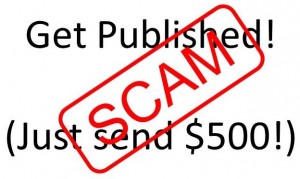As long as there has been money, there have been scammers trying to separate people from their coin while providing nothing in return. Today I’ll discuss scamming writers, from the scammer’s point of view. (Note: I am not encouraging scamming; I’m trying to make a point to budding writers.)
 In general, scams work best when your mark has a strong need for something, but not a lot of knowledge of the world. You’d think that a rare combination, but there’s enough of them out there for you to get by.
In general, scams work best when your mark has a strong need for something, but not a lot of knowledge of the world. You’d think that a rare combination, but there’s enough of them out there for you to get by.
People who want to be writers are particularly susceptible. Why? Glad you asked.
1. New writers without much experience are confused by the process. After all, it’s not like other businesses, where you get a company-paid training session on Day 1.
2. Writers can get really, really desperate to be published. They’re willing to do anything to see their name in print.
3. Writers work alone, so they’ve got no one to turn to for advice, guidance, or support.
4. Beginning writers are used to rejection, since they’ve been submitting stories and getting turned down often. That means you can string them along with vague promises awhile; for them, a half assurance is better than outright rejection.
5. In a lot of other businesses, you really do have to pay a little money now to make a lot of money later. Therefore, you can easily convince new writers that writing is the same way. Newbies don’t know that money should almost always flow to the writer.
6. The writing biz is just complicated enough so you can set up your scam at almost any point in it. You can be a scam-editor, a scam-publisher, a scam-agent, or a scam-marketer. You can offer a scam-writing workshop or scam-conference, run a scam-contest, or dozens of other things.
7. It’s difficult for new writers to distinguish your scam from a legitimate business. As long as your website looks professional, how are they going to tell? There are plenty of editors, agents, publishers, etc. that are legitimate and not scammers but are just bad at their job. Unlike us, they provide something to the writer, but it’s of low quality. We’re just one step across the line from them; our task is to give nothing in return for the writer’s money.
8. There’s no place a beginning writer can go to find out information about us scammers. Well, okay, there’s Writer Beware, but how many of them know about that? Besides, our message is positive and enticing (You can be published! You can have guaranteed sales of your stories!), but “Writer Beware” is just a downer.
I’m done thinking like a scammer. It felt so wrong and I had to scrub down in the shower for ten minutes just to get the slime off.
You understand my overall point. The scammers are out there, and they’re after your money. As a writer, money flows to you, not the other way around. There are resources out there to help you. Whether you’ve been scammed or not, whether you’re a scammer or not, I’d love to read any comments you have about this. Remember, it costs you nothing to leave a comment for—
Poseidon’s Scribe

